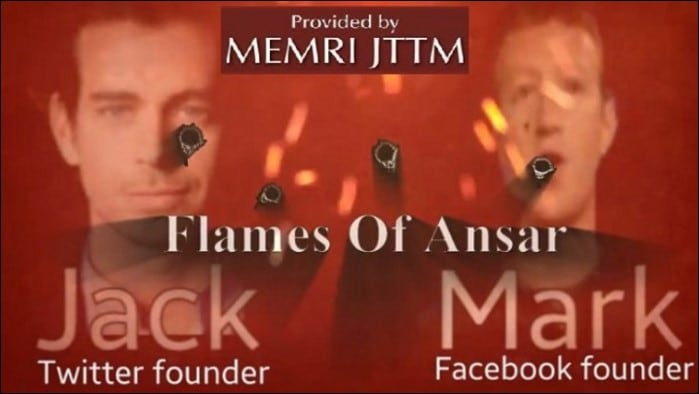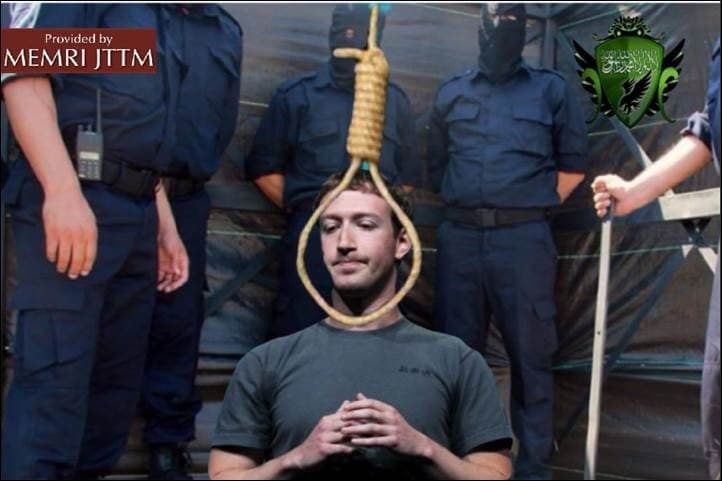Today, July 29, 2020, the leaders behind Amazon, Apple, Facebook, and Google are testifying before Congress (virtually) in the matter of the content that they allow online and other issues.[1] The following is a MEMRI Daily Brief by Executive Director Steven Stalinsky published nearly four years ago, on August 22, 2016, underlining that it is "time for tech founders and leaders to become personally involved in battle against cyber jihad." MEMRI's focus on the tech community and fighting online hatred is part of its Cyber Jihad Lab (CJL), which for the past 15 years has worked with tech companies and legislature, and on Capitol Hill, to craft and support efforts and solutions to combat hatred online. An abbreviated version of this MDB was published by Foxnews.com on August 12, 2016.

History Will Judge Tech Philanthropists In Fight Vs. Cyber Jihad
Nearly 15 years after the September 11 attacks, terror organizations like Al-Qaeda and Islamic State (ISIS) operate online unobstructed - propagandizing, recruiting and hacking. The fight against cyber jihad is neither easy nor cheap, and the West must engage tech companies' capabilities if it wants to win against these groups on the battlefield and in cyberspace.
The Obama administration can be credited with putting pressure on social media companies following the deadly attacks in Paris, Brussels, San Bernardino, and Orlando. Our next president needs to continue the coordinated efforts between tech companies and outside experts to quash the use of the Internet as a jihadi playground.
Time For Tech Founders and Leaders To Become Personally Involved In Battle Against Cyber Jihad
Along with academics, researchers and executives from 49 major technology, advertising, and entertainment companies - including Apple, Facebook, Google, Twitter and Microsoft - on February 24, 2016 I participated in the Madison Valleywood Project - the White House summit on countering violent extremism (CVE) online. The summit, organized by the Justice Department, was a unique opportunity to examine ways to challenge ISIS and its brand online. It followed other welcome moves by tech companies, including Facebook, which has taken the lead in shutting down terrorist accounts. Twitter also has recently moved firmly in this direction - at least for the time being. And, on May 20, Microsoft announced that it would not be allowing terrorist content on its platforms.
Tech Philanthropists Are Giving Away Billions of Dollars - They Should Now Pledge and Create A Fund for Fighting Cyber Jihad
But it is not only the social media companies that should be participating in these efforts. It is time for their founders and top executives, many of them billionaires, to do so. A first step would be collectively signing a public pledge and creating a fund to develop ways to stop jihadis from using their platforms - not just via their companies, but as private citizens and philanthropists, as well. Such an initiative by industry leaders like Microsoft founder Bill Gates, Twitter co-founder and CEO Jack Dorsey, Apple CEO Tim Cook, Google co-founders Sergey Brin and Larry Page, and Facebook founder and CEO Mark Zuckerberg could certainly jumpstart this effort and galvanize the entire industry to join it.
This public pledge should highlight their commitment to put an end to terrorists' use of their platforms while protecting privacy and freedom of speech, and should include the creation of industry standards for dealing with the problem - so that the next generation of tech companies will have a blueprint to follow. These tech leaders have come together in the past on issues ranging from climate change to immigration; there is no reason why they cannot do the same to stop cyber jihad. They should begin to offer conceptual and financial support to stop what they themselves inadvertently created.
These individuals are tremendously generous and donate billions to worthy causes. The tech industry creates more multimillionaires and billionaires than any other sector; the incredible technological advances these innovators have brought to the world have, according to public sources, earned them wealth beyond imagining. But one area is left unsupported: the urgent national security threat of cyber jihad.
Leading Tech Philanthropist Who Should Be Leading The Fight Against Cyber Jihad With Their Names, Expertise, And Money
Some key tech leaders have even been targeted by ISIS and Al Qaeda. The last two issues of Al-Qaeda in the Arabian Peninsula's Inspire magazine included threats against Microsoft founder Bill Gates, Oracle founder and CEO Larry Ellison, and former New York City mayor and media mogul Michael Bloomberg, who on June 30 in The Wall Street Journal called on tech companies to do more in fighting terrorism.

Threats in Issue 14 of AQAP's Inspire magazine against Gates, Ellison, and Bloomberg, September 9, 2015
Twitter's Dorsey has received death threats from ISIS sympathizers on numerous occasions on his own platform. Considering that Twitter has been the heart and soul of cyber jihad, its top current and former executives should be the first to join the effort to combat it.

Threat in a video released on Telegram by the pro-ISIS hacker group Sons Caliphate Army, against Twitter CEO Jack Dorsey and Facebook CEO Mark Zuckerberg, February 23, 2016
Others at Twitter who could be supporting the fight against cyber jihad are cofounder and board of directors member Evan Williams (worth $2.2 billion, who donates to free speech and privacy, voter participation, and LGBT issues); former CEO Dick Costolo ($430 million, who has reportedly donated to ALS research); cofounder Biz Stone ($200 million, who does philanthropic work in education, conservation, the environment, and animal welfare); and COO Adam Bain ($81 million, who has donated to food banks). Additionally, General Counsel Vijaya Gadde ($41 million) and former Vice President of Global Media, Katie Jacobs Stanton (who was also the White House's first Director of Citizen Participation and has an annual income of some $20 million) could all be supporting efforts to stop cyber jihad.
Google and Alphabet
After Twitter, jihadis rely heavily on YouTube and its parent organization, Google Inc. - both now part of Alphabet. For nearly a decade, YouTube has been used extensively by Al-Qaeda and its offshoots, including ISIS. YouTube and Google founders and senior staff, many of whom are generous philanthropists, could be supporting efforts to fight these cyber jihadi efforts. They include co-founders Larry Page (worth $29 billion, who has donated to technology and sustainable energy), Sergey Brin ($34.3 billion, who has supported Parkinson's research, technology, social entrepreneurship, and more), and executive chairman Eric Schmidt. It was Schmidt (worth $9 billion and a donor to environmental causes and education) who, in a May 2013 CNN interview, said in reference to stopping online jihadi activity, "[I]f there were an algorithm to detect terrorists, trust me, we would use it." Public Google and Alphabet support for defeating cyber jihad would be invaluable to the cause.
Facebook's action in this sphere could serve as a model for the entire industry; its leadership has gone on record as stating that it is dedicated to this fight, and has made concerted efforts in it. This includes Zuckerberg (net worth $37.7 billion, and a supporter of causes including education, immigration reform, and healthcare), against whom ISIS has made multiple death threats; cofounder Dustin Moscovitz, currently CEO of Asana ($9.3 billion, and a donor to causes involving health, economic development, marriage equality, and drug policy reform); and COO Sheryl Sandberg ($1.17 billion, and a donor to causes including women's issues, global health, poverty, and the environment), who recently suggested that Facebook users launch a digital war against ISIS by "liking" and posting kind messages on pages affiliated with it.

Image of Zuckerberg facing noose, posted by the ISIS-affiliated Kalachnikv E-Security Team hacking group, which is part of United Cyber Caliphate, on Telegram, March 17, 2016.
Facebook founding president and Napster cofounder Sean Parker ($2.8 billion) has urged wealthy young tech entrepreneurs to be as innovative and efficient in their philanthropy work as they are professionally; last summer, he announced he was donating $600 million donation to found his own philanthropic effort, the Parker Foundation. In April 2016 he announced $250 million in cancer immunotherapy funding.
Instagram, which was bought by Facebook, is increasingly popular among jihadis. Its cofounders Kevin Systrom ($400 million) and Mike Krieger ($100 million) also could be supporting efforts against cyber jihad. The company has also come under threat by jihadis, including on July 28 by a pro-ISIS disseminator whose account is frequently suspended -- he warned that he wanted to behead Instagram's staff.
The Internet Archives
The San Francisco-based Internet Archive (archive.org), which is run by its founder and digital librarian Brewster Kahle, is absolutely essential to both ISIS and Al Qaeda, as well as other jihadis, and is used daily for disseminating videos. Kahle should also be active against cyber jihad.
Tumblr
Other wealthy tech innovators involved in philanthropy who are natural partners in the effort to fight cyber jihad include Tumblr founder and CEO David Karp (worth $200 million). While he has thus far not been involved in philanthropy, he has noted "at some point I'm going to have to learn about" it. Tumblr usage by followers of ISIS, Al-Qaeda and other jihadi groups is constantly increasing.
Snapchat
Snapchat's popularity among jihadis has increased a great deal recently; at last count, the company and co-founder Evan Spiegel's worth have increased drastically. He, too, should be supporting anti-cyber-jihad efforts.
Encryption Technology
One of the most important developments for national security is the increasing use of encryption technologies, including on social media, by ISIS, Al-Qaeda, and other jihadis. Leading tech companies stand to make billions from new encryption products they will develop; they could at the same time be helping to prevent jihadi use of their products.
Apple
Apple is just one of the companies coming out with major encryption software that jihadis will likely adopt. Apple CEO Tim Cook (worth as much as $400 million) could be among those helping in this effort. The widow of Apple founder Steve Jobs, Laurene Powell Jobs (worth $21 billion), is an active philanthropist, and others who have made billions at the company. They could be supporting the efforts against cyber jihad.
Telegram
Some developers of new encryption technology are now reportedly worth millions, if not billions. Vkontakte (VK) and Telegram are both popular among jihadis, and in the past year, Telegram has become a major driver of cyber jihad for pro-ISIS groups - and has been even used recently to threaten the CEOs of Facebook and Twitter. In 2016, the founder of both services, Pavel Durov, made Forbes Russia's list of wealthiest individuals, with a net worth of over half a billion dollars.
Kik And Wickr
Kik, also used extensively by jihadis for encrypted communications, is worth $1 billion; founder and CEO Ted Livingston has donated $1 million to the University of Waterloo. Cofounders of the encrypted app Wickr, Nico Sell, Robert Statica, Chris Howell, and Kara Coppa, recently received $39 million in funding - they too could be helping in the fight.
Jan Koum, the founder of WhatsApp, is worth $7.3 billion, and could also be supporting the fight against cyber jihad. WhatsApp, bought by Facebook for $22 billion, is extensively used by members of jihadis. ISIS supporters are closely monitoring and debating the usage of the new end-to-end encryption added to the platform recently, which has made the platform more popular among them. Koum has donated to many causes.
Other Industries Work To Counteract The Problems They Cause - Tech Companies Should Do Likewise
The technologies developed by these and other leaders of the tech community are allowing ISIS, Al-Qaeda, and other jihadi groups to thrive, and they should be supporting ways to challenge this. Paper companies invest in reforestation. Auto manufacturers invest in accident prevention. Energy producers invest in alternative energy. Alcohol and tobacco companies sponsor anti-smoking and anti-drunk driving efforts. And tech billionaires have a moral and financial obligation to help stop cyber jihad.
Many more tech millionaire and billionaire philanthropists affiliated with social media companies and websites that are widely used by terrorist groups (too numerous to mention here) should be joining the fight against cyber jihad. These tech leaders wield as much or more influence as did Andrew Carnegie and John Rockefeller more than a century ago - and they need to consider that if they do not support the fight against cyber jihad, history may judge them as harshly as it has these "robber barons" of the Gilded Age.
APPENDIX: Other Wealthy Tech Leaders Whose Companies Are Regularly Used By Jihadis Who Could Support The Fight Against Cyber Jihad
Yahoo! founder David Filo ($2.9 billion) has donated to many universities, and to sustainable energy; Yahoo CEO Marissa Mayer is worth $300 million; SoundCloud, according to The Wall Street Journal, is valued at over $1 billion, and its CEO, Alexander Ljung, could be donating; Ask.fm is said to be worth £50 million (roughly $78 million), and CEO Ilja Terebin, could be too.
Other tech billionaires and multimillionaires have donated generously to a wide range of worthy causes. Tech entrepreneur and venture capitalist Marc Andreessen, Salesforce.com founder Marc Benioff, Amazon founder and Washington Post owner Jeff Bezos, AOL founder Steve Case, serial entrepreneur and investor Mark Cuban, Dell founder Michael Dell, LinkedIn founder Reid Hoffman, Groupon founder Eric Lefkofsky; PayPal, SpaceX, and Tesla Motors cofounder Elon Musk; Craigslist founder Craig Newmark; eBay founder Jeff Skoll; Scott D. Cook of Intuit; Meg Whitman of HP; Virgin Group's Richard Branson; Alibaba CEO Jack Ma; and eBay founder Pierre Omidyar are just some of the other tech billionaires who could be donating to fight cyber jihad.
Protection services provided by CloudFlare, a content delivery network and distributed domain name server, which according to Forbes and others is a billion-dollar company, have been used by jihadis to hide their identities and locations. CloudFlare founders Matthew Prince, Lee Holloway, and Michelle Zatlyn could also be supporting the efforts to fight cyber jihad.
*Steven Stalinsky is the Executive Director of the Middle East Media Research Institute (MEMRI). He is the author of the upcoming book American Traitor - The Rise and Fall of Al-Qaeda's U.S.-Born Leader Adam Gadahn.
[1] Washingtonpost.com/technology/2020/07/29/apple-google-facebook-amazon-congress-hearing., July 29, 2020
Latest Posts



